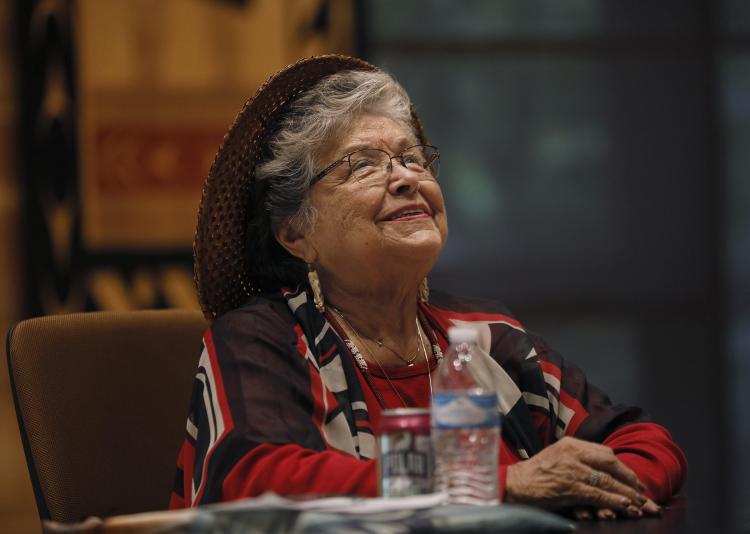The Storytelling of Jamestown S’Klallam Elder and Storyteller Elaine Grinnell
By Jackie Johnson, MC, (Makah Tribe) Partnerships for Native Health, Washington State University
On Thursday, August 8, 2019, Elaine Grinnell, Jamestown S’Klallam elder, shared her stories and knowledge on Indigenous Aging at University of Washington’s Intellectual House. This storytelling event was hosted by Washington State University’s Partnerships for Native Health, University of Washington Alzheimer’s Disease Research Center, the Art of Alzheimer’s, and Seattle’s Department of Neighborhoods. Mrs. Grinnell told animated stories of growth, aging, and family roles, and she led a discussion about resiliency and destigmatizing aging.
Elaine began the event with a story about a grandfather teaching his young grandson lessons to transfer knowledge and to prepare the grandson for life after he passes on. The last lesson the grandfather taught the grandson is that small change can have large impacts. After, Mrs. Grinnell reflected about her grandfather, the source of her talent of storytelling, and the day she won a foot race between them. Today, being a grandmother of nine, she sees that her grandfather did this out of the love he had for her, and then to gauge his physical fitness. Competing in these races, he fought to stay active and prolonged the inevitable day that he wouldn’t physically be able to race. Elaine related this memory to how she reminds and encourages herself to keep doing tasks, like walking unassisted, on her own for as long as she can, because it’s easy to accept the offered assistance. But like her grandfather, she knows that maintaining strength and being active with family is healthier.
As with physical strength, mental and social strength is of high importance in aging. Mrs. Grinnell spoke about her uncle, who was diagnosed with Alzheimer’s, the most common type of dementia. Her uncle was reluctant to acknowledge his initial memory loss until it became apparent to the family and the community when he drove around the small town of Sequim for eight hours. He was unable to remember his way home. After this, Elaine and her family created a caretaking plan for the uncle so that they could provide him with the best life moving forward. This entailed safety measures, such as taking away the car keys, and cultural measures, such as family prayers.
It is projected that 35% of the Native American population will develop dementia in the next 25 years. Fewer than 50% of cases of dementia are diagnosed in a clinical setting. There is no cure, but early diagnosis and interventions slow the symptoms and improve the quality of life. Family and community members are more likely to see the initial progress of the memory loss than elders themselves. With this knowledge, family and community members can encourage elders to have early screenings for mild cognitive impairment and dementia as well as advocate to community leadership that more screening tools are needed, such as training practitioners to conduct screenings. Having a well-rounded diet, exercising, learning a new skill, such as a language, and being social may reduce the risk of dementia and Alzheimer’s disease.
The event concluded with a screening of the UW ADRC and Partnerships for Native Health’s tribal outreach video on the prevalence of Alzheimer’s among Native communities. Elaine spoke about of the importance of individual resiliency – the refusal to be stagnant at any age. She closed with a message for families dealing with memory loss and dementia: “We shouldn’t be ashamed. Our families should be there or someone who cares. Be brave. Don’t give up, learn, and do something every day. Move forward not backward.” •





